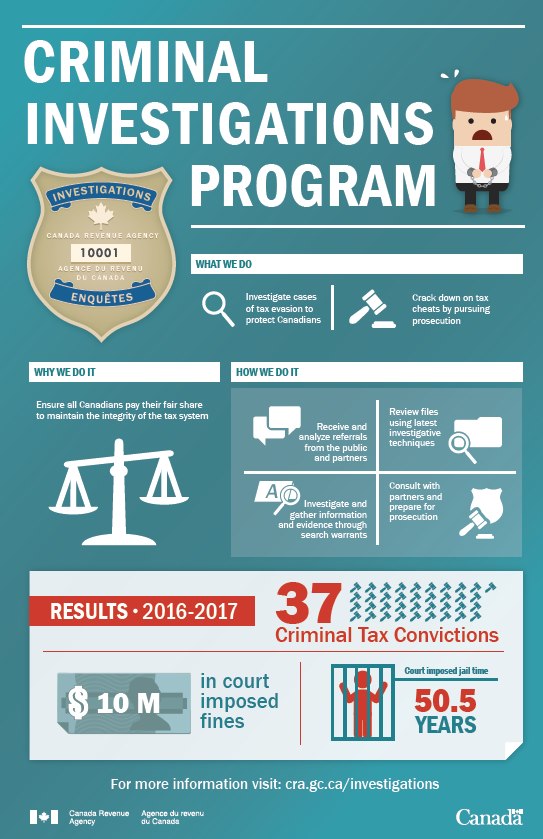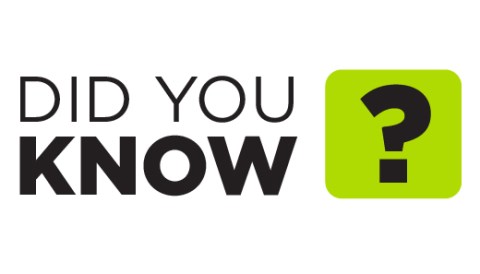Tax evasion. There are consequences.

The CRA’s Criminal Investigations Program is protecting Canadians and the tax system
The Criminal Investigations Program investigates significant cases of tax evasion, fraud and other serious violations of tax laws and where appropriate refers cases to Public Prosecution Service of Canada for criminal prosecution.
The Criminal Investigations Program focuses on the most serious cases that meet one or more of the following criteria:
- significant and/or material cases of tax evasion with an international element
- promoters of sophisticated and well organized tax schemes aimed at defrauding the government
- joint financial crime cases with other enforcement agencies including cases of tax evasion involving money laundering and terrorist financing
- significant and/or material cases involving income tax and/or GST/HST tax evasion including the underground economy
The CRA works closely with the RCMP, provincial and local police, and other law enforcement agencies on tax cases to crack down on tax cheats and maintain the integrity of the tax system.
The CRA shares knowledge and expertise with domestic and international partners. This information helps to identify new schemes and challenge those who deliberately evade their taxes. Our intelligence gathering capabilities enhances our ability to identify and address global tax evasion.
The CRA also has the necessary tools in place to detect and investigate promoters who are suspected of facilitating tax evasion.
What is tax evasion?
Tax evasion occurs when an individual or business intentionally ignores Canada’s tax laws. This includes falsifying records and claims, purposely not reporting income, or inflating expenses.
Combatting tax evasion and other financial crimes is important financially and socially. The quality of life that all Canadians enjoy is supported by the taxes we pay. Revenues collected help to fund programs and services such as health care, childcare, education, and infrastructure projects that benefit all Canadians.
What are the consequences of tax evasion?
Tax evasion is a crime. Whether you’re cheating on your taxes here in Canada or hiding assets or money in foreign jurisdictions, the consequences are serious. Tax evasion has a financial cost. Being convicted of tax evasion can also lead to fingerprinting, court imposed fines, jail time, and a criminal record.
When taxpayers are convicted of tax evasion, they must still repay the full amount of taxes owing, plus interest and any civil penalties assessed by the CRA. In addition, the courts may fine them up to 200% of the taxes evaded and impose a jail term of up to five years.
To learn more about the consequences of evading your taxes, watch the video called Criminal Investigations Program – Tax evasion.
What are the different forms of tax evasion?
Have assets outside of Canada?
Canadians are required to report their worldwide income to the CRA and to pay the appropriate taxes on this income. Not reporting income from foreign sources is illegal. Choosing to ignore or not follow tax laws will result in serious consequences, including penalties, court fines, jail time, and a criminal record.
For more information on what happens when you hide assets offshore, watch the video called Criminal Investigations Program – Offshore non-compliance.
Tax protesters
Is someone trying to convince you that you don’t have to pay tax on the income you earn? Beware! Some individuals not only fail to report their own earnings, but also conspire, counsel, and promote others to participate in such schemes.
Protect yourself against tax schemes and understand the consequences you might face. To learn more, watch the video called Criminal Investigations Program - Tax protesters.
Tax schemes promoters
Some individuals or organizations promote or sell tax arrangements, plans, or schemes that are not legal. They deliberately misrepresent or make false statements involving tax shelters or arrangements to assist clients in evading taxes, all the while obtaining a financial benefit.
The Agency is committed to taking full action against anyone who abuses the tax system. For more information, watch the video called Criminal Investigations Program – Promoters of tax evasion schemes.
Enforcement notifications
The CRA has set up a free subscription service to help Canadian taxpayers stay current on the CRA’s enforcement efforts. Subscribers will receive notifications about CRA enforcement activities, which may include information on convictions and in some instances, the execution of searches and the laying of criminal charges. This service will increase awareness of CRA enforcement actions and warn Canadians about potential fraud schemes.
For more information on the CRA convictions and to subscribe to this service go to Enforcement notifications.
Did you know?
From April 1, 2012 to March 31, 2017, the CRA convicted 408 individuals and businesses. This involved approximately $122 million in federal tax evaded and court sentences totaling $44 million in court fines, and 3103 months in jail.
Between 2006 and 2017, 75 tax scheme promoters from across Canada were successfully convicted of tax offences related to tax schemes. This led to $7.15 million in court imposed fines and a total of 936 months of jail awarded.
On June 13, 2017, over 80 tax investigators from the CRA and the United Kingdom’s tax authority executed searches in both countries as part of an ongoing investigation of an alleged carousel tax fraud scheme against the Government of Canada.
What can you do?
Be aware of your reporting obligations
Taxpayers must report certain foreign assets with a total cost of more than $100,000 on Form T1135, Foreign Income Verification Statement, by the filing due date of their income tax return. They must also make sure that they have properly reported any foreign income and gains on their income tax return.
Submit information to the Offshore Tax Informant Program
Are you aware of a situation or do you have information regarding international tax avoidance? To learn more, go to Report offshore tax cheating.
Submit information to the National Leads Centre
Report suspected tax evasion to the Leads Program. Your identity will not be disclosed and you may provide information anonymously.
Infographic
Infographic: Criminal investigation program (PDF)

Image description
Criminal investigation program
What we do: Investigate cases of tax evasion to protect Canadians and crack down on tax cheats by pursuing prosecution.
Why we do it: Ensure all Canadians pay their fair share to maintain the integrety of the tax system.
How we do it: Receive and analyze referrals from the public and partners. Review files using latest investigative techniques. Investigate and gather information and evidence through search warrants. Consult with partners and prepare for prosecution.
Results 2016-2017: 37 criminal tax convictions, $ 10 M in court imposed fines, 50.5 years of court imposed jail time.
